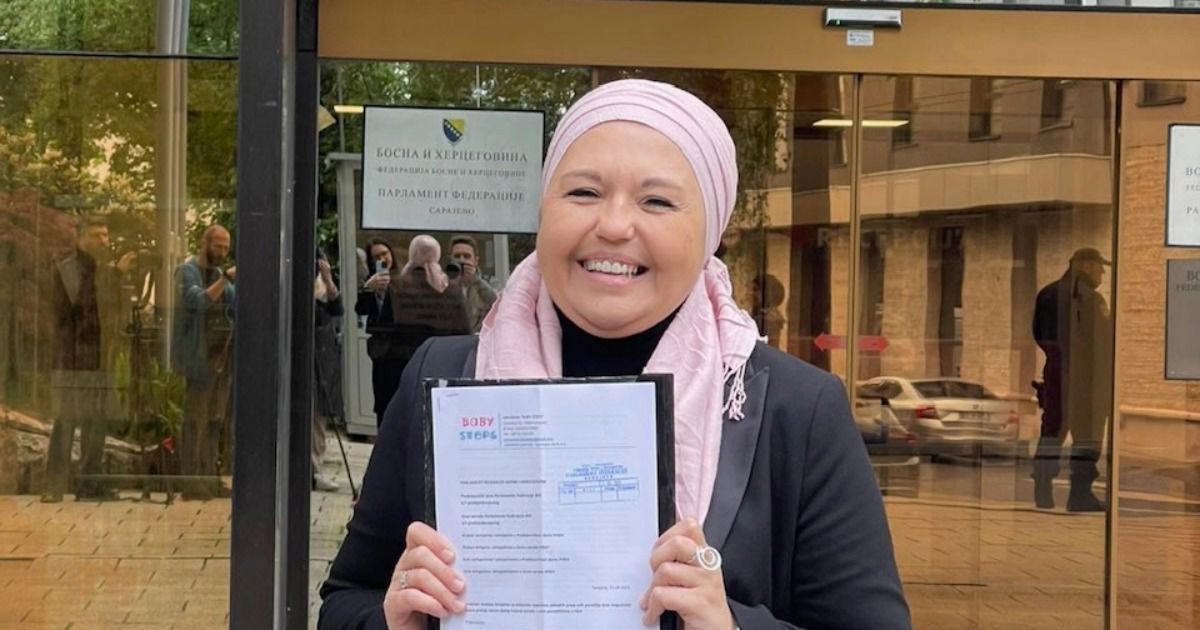
The day after the session of the House of Peoples of the Parliament of FBiH, discussions continue about the adopted Proposal of the Conclusion by the Gender Equality Committee, which supports the Initiative to enable companionship for mothers during the entire course of childbirth in all public maternity wards in the Federation of BiH. But what does this actually mean?
We remind you that these are initiatives of civil society organizations that share the same key demand – that all mothers be granted the right to companionship during childbirth. One of the initiatives with this request was launched by the association Baby Steps, with the support of the PRAGG project.
Given that this is an important issue and a potentially significant step forward for Bosnian society, it is not surprising that yesterday’s decision in the Federal Parliament provoked strong public reactions.
Members of the House of Peoples of the Parliament of FBiH adopted the following conclusion yesterday:
“The Government and the competent ministry are tasked to, as soon as possible and no later than within 90 days, conduct an analysis of the current situation and legal framework and propose the adoption of regulations that will enable companionship during childbirth in all public maternity wards in FBiH.”
Thus, this is a potentially important, but not final step towards establishing companionship during childbirth as a right of mothers to safety, support, and dignity. Deadlines are still awaited, procedures are being carried out, while mothers’ rights remain within the realm of promises with uncertain outcomes.
In their address to the media, the Baby Steps association stated:
“We don’t need another form of ‘support’ in the shape of a conclusion. We need a decision that changes something. We need an obligation – not a recommendation. We need solutions – not new deadlines. For a woman who is pregnant today, 90 days is too long. For a woman giving birth tomorrow – every day without companionship is another day in fear and injustice. That is why we will continue tirelessly working to ensure that every woman has the right to companionship – without conditions, without excuses, and without delays.”
So, what exactly does the adopted decision entail?
In this particular case, the Parliament has once again tasked the Government and the competent ministry to take action. However, experience shows that such conclusions are often not implemented, or that the Government simply ignores them. Moreover, the very purpose of such conclusions is often not their implementation, but rather to calm public opinion and redirect attention elsewhere. This raises questions about the value of yesterday’s conclusion and its actual implementation.
Therefore, the sharp reaction from Baby Steps is completely understandable and justified.
On the other hand, Aida Obuća, delegate in the House of Peoples of the Parliament of FBiH, claims that this is a conclusion of a legislative body, directed to the executive authority, and that it carries a binding status. She added that the Ministry and the Government of FBiH now have the space to choose the best way to enable companionship during childbirth, based on current practices and examples from the region. Furthermore, she emphasized that in all modern societies – which BiH aspires to join – laws and procedures must be respected, and that yesterday’s conclusion is an important first step. Now, the legislative body, i.e. the delegates in Parliament, as well as representatives of civil society and the public, must closely monitor the implementation of this conclusion and apply pressure to ensure its realization.
It should be noted, however, that this is not the first attempt to regulate this issue. None of the previous attempts produced concrete results. Activist efforts to protect mothers’ rights have continuously collided with the walls of political indifference and reluctance to initiate change.
The association Baby Steps already in 2022 submitted initiatives for companionship to the entity ministries of health, along with an analysis of the situation and a petition signed by more than 10,000 people.
In addition, initiatives were launched in the Federal Parliament, when in 2023 MP Marijana Hrvić-Šikuljak submitted an initiative to enable companionship during the entire childbirth, including natural birth and caesarean section, in all maternity wards in the Federation of BiH. In her initiative, Hrvić–Šikuljak pointed out that “obstetric violence (physical and psychological abuse during pregnancy, childbirth and postpartum) is still present in maternity wards in FBiH, which constitutes a violation of basic human and patient rights, and can lead to health complications, postpartum depression, psychological disorders, and in the worst cases, death of the mother and/or baby due to neglect.” Although the initiative received support, it was never discussed!
As a result of all these efforts, in April 2024, the Federal Ministry of Health of FBiH published the “Guidelines for Intrapartum Care in the Federation of BiH”, which include recommendations for enabling companionship during the entire childbirth – but no further progress was made. Despite this, mothers in maternity wards still do not have companionship.
“At the entity levels, recommendations and guidelines have been developed that could improve practice and protect mothers’ rights. However, the implementation process of such changes takes a very long time, and the lack of clear accountability mechanisms further hinders progress. The health system still does not show enough initiative to proactively improve mothers’ rights, not even in basic issues such as the right to companionship during childbirth. This, unfortunately, points to a serious systemic problem in which fundamental human rights, patient rights, and women’s rights are not sufficiently recognized,” said a Baby Steps representative earlier for the portal Odgovorno.
Now the 90-day countdown has started for the Government to propose a regulation that will enable companionship during childbirth in all public maternity wards in FBiH. Unfortunately, this time is lost for the women who will give birth during this period. Whether, at least after those 90 days, the demands from the initiatives will be respected and the necessary change will finally take place – making companionship during childbirth a right of every mother – remains to be seen.






